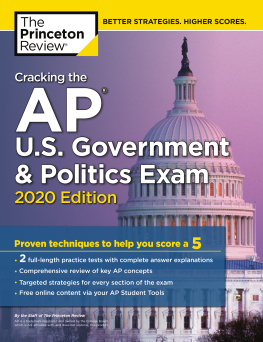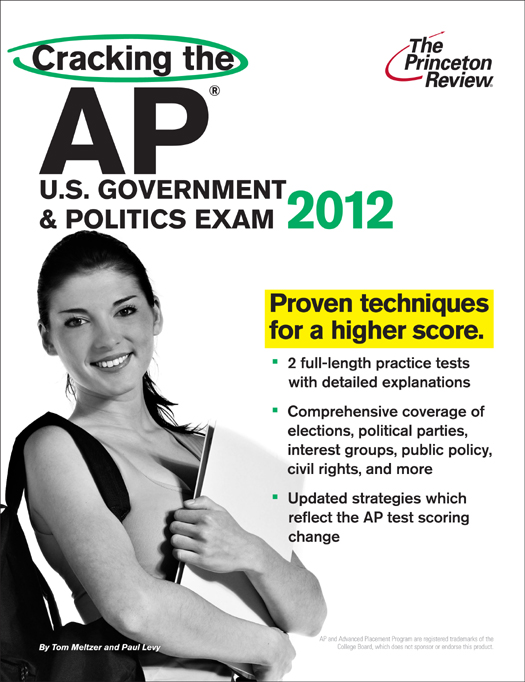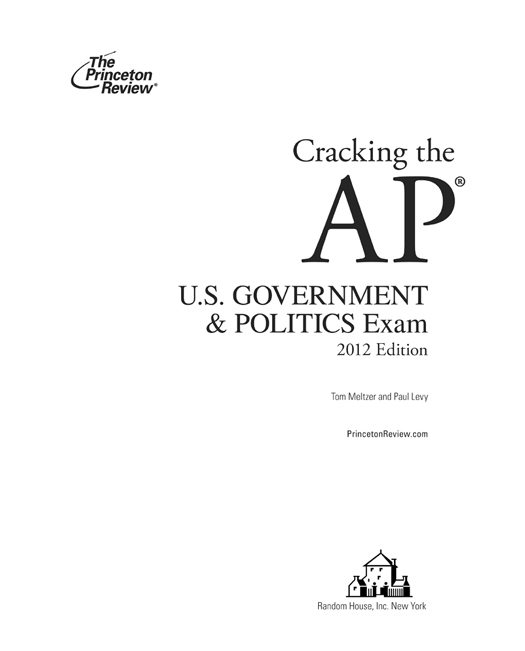
Editorial
Rob Franek, VP Test Prep Books, Publisher
Seamus Mullarkey, Associate Publisher
Laura Braswell, Senior Editor
Selena Coppock, Editor
Heather Brady, Editor
Random House Publishing Team
Tom Russell, Publisher
Nicole Benhabib, Publishing Manager
Ellen L. Reed, Production Manager
Alison Stoltzfus, Associate Managing Editor
The Princeton Review, Inc
111 Speen Street, Suite 550
Framingham, MA 01701
E-mail:
The Princeton Review is not affiliated with Princeton University.
Copyright 2011 by The Princeton Review, Inc.
Cover design 2011 by Random House, Inc.
Cover art 2011 Daniel Kaesler/ Alamy
All rights reserved. Published in the United States by Random House, Inc., New York, and in Canada by Random House of Canada Limited, Toronto.
eISBN: 978-0-307-94450-4
ISSN: 1097-2757
Editor: Calvin Cato
Production Editor: Stephanie Tantum
Production Coordinator: Deborah A. Silvestrini
2012 Edition
v3.1
ACKNOWLEDGMENTS
I want to thank all the great Princeton Review teachers Ive worked with over the years. They are quite simply the brightest, most creative, and most energetic group of people Ive ever come across, and they are undoubtedly The Princeton Reviews greatest asset.
Special thanks also go to Richard Strean, Matthew Polazzo, and John Hoj for their expertise. Finally, thanks to my family, the guys in my band5 Chinese Brothersand most especially to Lisa.
Tom Meltzer
The Princeton Review would like to thank John Moscatiello for his work updating the 2012 edition of this book.
CONTENTS
I NTRODUCTION
WHAT IS THE PRINCETON REVIEW?
The Princeton Review is an international test-preparation company with branches in all major U.S. cities and several cities abroad. In 1981, John Katzman started teaching an SAT prep course in his parents living room. Within five years, The Princeton Review had become the largest SAT prep program in the country.
Our phenomenal success in improving students scores on standardized tests is due to a simple, innovative, and radically effective philosophy: Study the test, not just what the test claims to test. This approach has led to the development of techniques for taking standardized tests based on the principles the test writers themselves use to write the tests.
The Princeton Review has found that its methods work not just for cracking the SAT, but for any standardized test. Weve already successfully applied our system to the GMAT, LSAT, MCAT, and GRE, to name just a few. Obviously you need to be well versed in government and politics to do well on the AP U.S. Government & Politics Exam, but you should remember that any standardized test is partly a measure of your ability to think like the people who write standardized tests. This book will help you brush up on your political knowledge and prepare for the exam using our time-tested principle: Crack the system based on how the test is created.
We also offer books and online services that cover an enormous variety of education and career-related topics. If youre interested, check out our website at PrincetonReview.com.
PART I
The Test and
How to Crack It
1
A BOUT THE A DVANCED
P LACEMENT P ROGRAM
WHAT IS THE ADVANCED PLACEMENT PROGRAM?
The fact that youre reading this book means that you probably already know something about the Advanced Placement (AP) program: After all, how many people pick up a test-preparation guide for a little light reading? So, you probably already know that the AP courses at your high school are supposed to be the toughest available and that, at the end of the school year, you can take an AP exam that may allow you to earn college credit for your work in the course. However, there are a few things you probably dont know: Who decides what constitutes an AP course? Are AP courses the same at every high school? Who writes and grades the AP exam? This section of the book answers these and other related questions.
The Advanced Placement program is coordinated by an organization called the College Board. The College Board oversees college-admissions examinations; it also publishes test and course materials from previous years, holds seminars on college admissions, and sponsors educational research. Its membership is made up of college administrators and educators; college admissions officers; and high school administrators, college counselors, and teachers.
The College Board appoints a development committee for each of the 34 subjects in which AP exams are available. Each committee meets to decide what should be covered in an AP course and what should be on the AP exam. The Government and Politics Examination Committee, which writes both the U.S. Government and the Comparative Government Exams, is made up of six peopletwo high school government teachers and four college professors (two experts in U.S. government, two experts in comparative government). Its decisions are included in a publication called Advanced Placement Course Description: Government and Politics, which is available from the College Board. Dont bother buying itour book includes all the pertinent information from that booklet. If you want to take a look at it, ask your teacher if he or she has a copy; most social studies departments have copies of all the important College Board AP publications. It is also available as a free download on the College Boards website: www.collegeboard.com.
The development committee has two important jobs: to update the course description to reflect recent events and trends in political science and to write the AP U.S. Government and Politics examinations. The committee is therefore responsible for making changes to both the course syllabus and to the test content and format. When the committee finishes writing an exam, it hands the test over to the Educational Testing Service (ETS), which prints and administers the exam. ETS also normalizes the multiple-choice section; that is, ETS makes sure that it is no harder or easier than the previous years multiple-choice section. Yes, ETS is the same group that administers the SAT and many other admissions exams; fortunately, its role in creating AP exams is more limited than it is on the SAT.
No one forces teachers to teach AP Government in a particular way; the committees requirements are actually more like suggestions. If you discuss your AP Government course with a friend taking the same course at a different school, you will likely find that his or her course is noticeably different from yours (especially if you are using different textbooks). Dont worry about these differences: There is no one right way to teach AP Government. All teachers will interpret the meaning and importance of events in their own manner. In that way, your AP Government course is similar to a college course. In most other ways, it will probably be easier than a typical college course, although much harder than a typical high school course.
S HOULD Y OU T AKE AP C LASSES ? S HOULD Y OU T AKE AP E XAMS ?
Theres an obvious downside to taking AP classes: They are more difficult than regular classes. AP classes mean more detailed lectures, more homework, more research papers, more tests, and possibly a lower grade. So why take an AP course?





